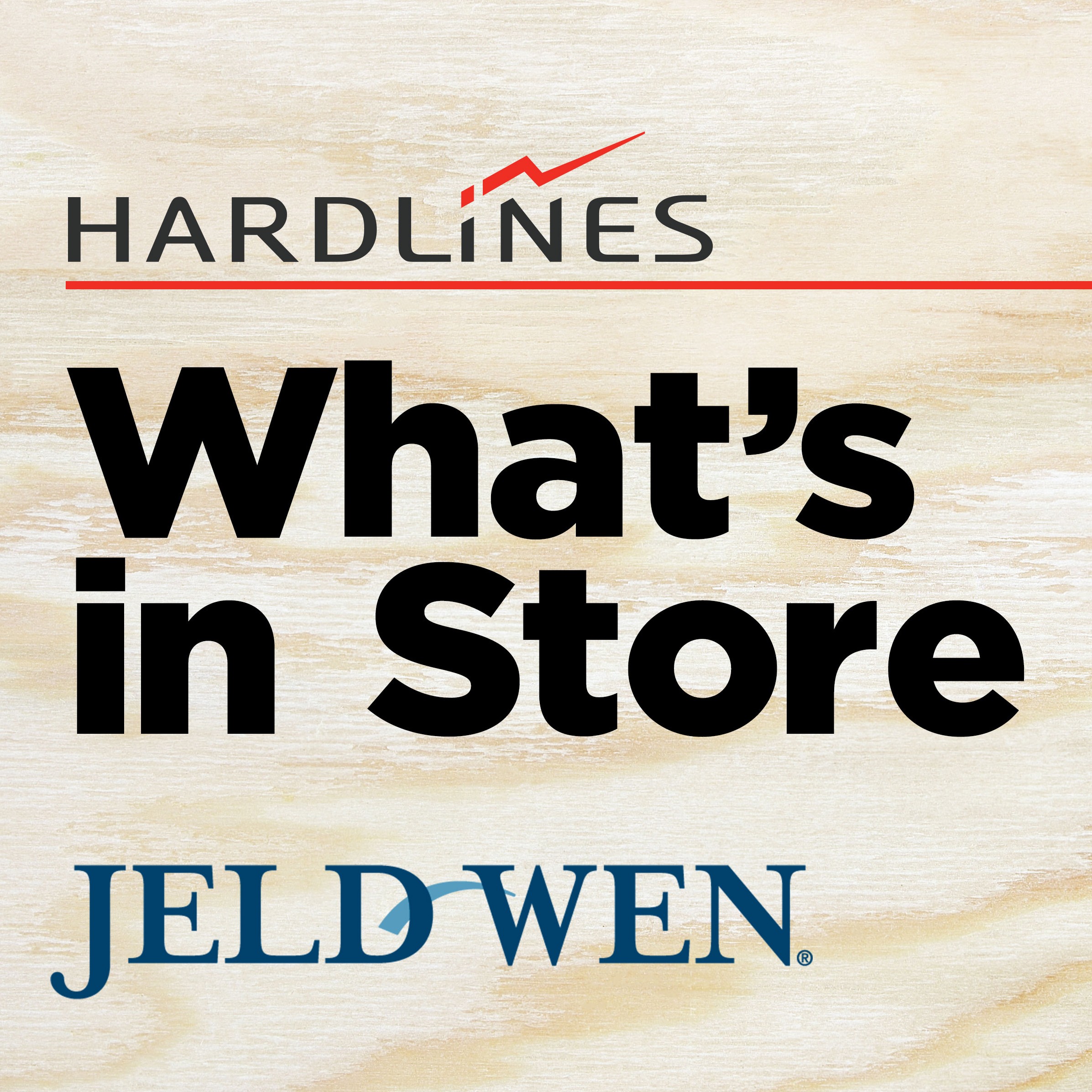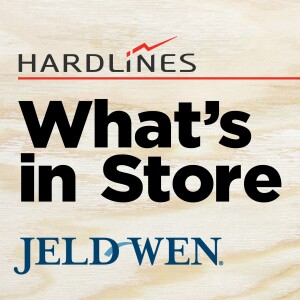
6.6K
Downloads
43
Episodes
This podcast series is dedicated to interviews with industry leaders from the retail, wholesale, and vendor sides of home improvement retailing. Get insights into the trends and challenges confronting retailers in general and in particular the dealers who sell products and services for building, repairing, and renovating homes.
Episodes

Wednesday Feb 28, 2024
Author and HR advisor Pierre Battah speaks with Hardlines President Michael McLarney
Wednesday Feb 28, 2024
Wednesday Feb 28, 2024
Hardlines President and podcast host Michael McLarney interviews Pierre Battah, a leading HR advisor in Canada and best-selling author of Humanity at Work: Leading for Better Relationships and Results. Pierre shares HR wisdom and focuses on engagement, which has a direct connection to sales and profitability. Pierre offers great advice on supporting engagement, and why the HR team does not replace the employee’s relationship with the boss.
Listen in for some profitable wisdom on dealing with the people you hire.
Key Takeaways:
[:43] Michael welcomes Pierre Battah, a leading HR advisor in Canada, a regular on CBC Radio and Radio Canada, and the best-selling author of Humanity at Work: Leading for Better Relationships and Results, to What’s In Store.
[2:07] The HR function is often managed “on the fly” by the store manager in smaller businesses. Having an HR center of expertise to step in with pay and benefits, disciplinary issues, and recruitment does not absolve the dealer or store manager from dealing with people every day. With or without HR people, working with people is a messy business.
[3:01] The primary concerns here are sales and profitability. This is about how to create the kinds of conditions with the people working in the shop that the enterprise is successful, customers are happy, and sales and profitability are positive as a result of the people in the shop.
[3:52] The front-line supervisor, owner, or store manager bears the brunt of managing people.
[4:32] If your people are reasonably happy, satisfied, and engaged, that will flow through to your customers. Engaged people show up and are attentive, go the extra mile, and are positive in how they speak to customers, colleagues, and friends. This positive signaling impacts the clients and community.
[6:16] It’s so hard to find people. When we can finally get those folks in the door, if we just pay a little more attention, on a day-to-day basis, we can engage our folks and hang onto them a little longer
[7:21] Recruitment, safety, training, onboarding, and all functions of HR are necessary. All indicators suggest that if we pay attention to engagement, we’ll positively impact the other roles of HR.
[8:03] The goal of managing a team is engagement. There’s a straight-line relationship between people being engaged and profitability, sales, fewer accidents, and less theft. Whether or not you have HR leads or advisors, it’s how we manage day-to-day that makes the most difference.
[9:10] About 30% of our folks are “born engaged.” About 20% of our folks see a job as a transactional relationship and won’t be engaged. If we do the right things, we have a shot to engage the remaining 50% of people. The most important relationship employees have is with their boss. If daily interaction is reasonably positive, the employee will likely become engaged.
[10:56] It comes down to small things. For example, clarity in what’s expected overshadows everything else. Be absolutely clear on the priority of the day; the manager or supervisor checks in with the employees to make sure the priority is understood. That has a huge impact on how people will do their jobs.
[12:28] There’s a handful of things that if you keep them present in how you interact with your people, you stand a good chance of having people give you their best, show up, and be positive when they’re there.
[13:07] Revisit what is expected frequently so there is never any doubt about what’s expected. Pierre shares an example.
[14:01] Catch people doing something right, and in the moment, make a quick comment about it. Don’t just say “Good job!” but tell what was good and why. That puts credits in the bank, so when you do have to have a corrective conversation, you’ve got a fair amount of goodwill in place, already.
[16:20] Are your people clear on what’s expected? Are you giving them positive feedback when they’re doing a good job? Do you listen to them? Does their opinion matter to you? Do you care about them as human beings? Do you provide them with learning opportunities? The check-in is a wonderful opportunity to do all the things that engage people.
[17:19] Pierre explains the key difference between checking in and checking up. Both are necessary activities. Checking in is a brief one-to-one conversation with everybody, maybe at the start of the shift. A morning meeting is great, but you still need to check in, one-to-one.
[20:08] Yes morning meetings can help, staff meetings can help, but If I can’t convince you to go one-to-one, then as you’re managing by walking around, slow down to say hello, ask people how they’re doing, how their day is going, and hear them out a little bit.
[20:46] People need to be seen, they need to be heard, they need to be valued, and they need to be encouraged. That’s what we’re working toward.
[21:26] Listening to what people have to say is important. Salespeople are gifted active listeners. They understand the simple power of asking simple, open-ended questions. Make good eye contact and nod with folks as they’re speaking, be present as they are sharing whatever they want to share, and do not interrupt. Be curious about what’s going on.
[24:16] If you own too many stores to know everyone by name and family, just be present and curious about the person you are talking to. People will remember that.
[25:46] Pierre shares a case study of engineers asking advice from hourly workers in a mine. Even though the advice was not used, the workers felt honored to be asked. When they were told why the advice was not used, it helped them learn more about the operation.
[27:23] People engage when they feel heard and that their opinions matter. There is enormous value in asking for their opinion.
[28:17] People want to know if they are meeting expectations. Managers have an obligation to catch people doing things right and have mostly positive conversations but also take the less frequent opportunity to correct when needed. Pierre shares a framework for that corrective conversation. To conclude the correction, move into problem-solving mode and encouragement.
[31:50] Michael thanks Pierre Battah for the great instruction and invites listeners to replay the last few minutes to capture all the points. Michael thanks Pierre for joining us on What’s In Store. Thank you to all of our listeners, wherever you are.
About Us:
What’s in Store is a podcast series of the Hardlines Information Network. Today’s episode is brought to you by Jeld-Wen.
Resources:
Humanity at Work: Leading for Better Relationships and Results, by Pierre Battah
Guest: Pierre Battah
Sponsor: Jeld-Wen
Quotes:
The primary concern here, of course, is sales and profitability. Let’s get down to it. … This is about how do I create the kinds of conditions with the people in the shop that I recruit and retain, in such a way that the enterprise is successful? — Pierre Battah
By and large, it’s the people on the floor, as front-line supervisors, managers, or owners, who are bearing the brunt of having to manage people. — Pierre Battah
Whether or not you have HR leads or advisors, how we manage day-to-day makes the most difference. — Pierre Battah
The absence of some one-on-one connection with my folks is a great way to disconnect them, and disconnecting means we’re on our way to disengagement here, and when we’re on our way to disengagement, we’re potentially on our way to a departure. — Pierre Battah
We’ve learned that people need to be seen, they need to be heard, they need to be valued, and they need to be encouraged. That’s what we’re working toward, ultimately. — Pierre Battah

Comments (0)
To leave or reply to comments, please download free Podbean or
No Comments
To leave or reply to comments,
please download free Podbean App.